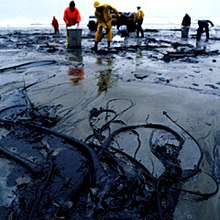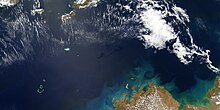

| Part of a series on |
| Pollution |
|---|
 |
An oil spill is the release of a liquid petroleum hydrocarbon into the environment, especially the marine ecosystem, due to human activity, and is a form of pollution. The term is usually given to marine oil spills, where oil is released into the ocean or coastal waters, but spills may also occur on land. Oil spills can result from the release of crude oil from tankers, offshore platforms, drilling rigs, and wells. They may also involve spills of refined petroleum products, such as gasoline and diesel fuel, as well as their by-products. Additionally, heavier fuels used by large ships, such as bunker fuel, or spills of any oily refuse or waste oil, contribute to such incidents. These spills can have severe environmental and economic consequences.
Oil spills penetrate into the structure of the plumage of birds and the fur of mammals, reducing its insulating ability, and making them more vulnerable to temperature fluctuations and much less buoyant in the water. Cleanup and recovery from an oil spill is difficult and depends upon many factors, including the type of oil spilled, the temperature of the water (affecting evaporation and biodegradation), and the types of shorelines and beaches involved.[1] Spills may take weeks, months or even years to clean up.[2]
Oil spills can have disastrous consequences for society; economically, environmentally, and socially. As a result, oil spill accidents have initiated intense media attention and political uproar, bringing many together in a political struggle concerning government response to oil spills and what actions can best prevent them from happening.[3]
- ^ "Lingering Lessons of the Exxon Valdez Oil Spill". Commondreams.org. 2004-03-22. Archived from the original on June 13, 2010. Retrieved 2012-08-27.
- ^ NOAA Ocean Media Center (2010-03-16). "Hindsight and Foresight, 20 Years After the Exxon Valdez Spill". NOAA. Retrieved 2010-04-30.
- ^ Wout Broekema (April 2015). "Crisis-induced learning and issue politicization in the EU". Public Administration. 94 (2): 381–398. doi:10.1111/padm.12170.